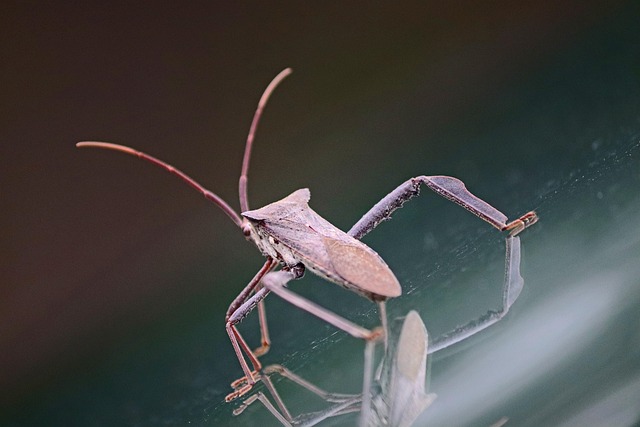In an era focused on sustainability, ethical cockroach treatment services are vital for public health and environmental preservation. Traditional toxic methods are being replaced by humane alternatives like Integrated Pest Management (IPM), emphasizing prevention, sanitation, and non-toxic solutions. Innovative strategies, including habitat modification, bait stations targeting specific species, and heat treatment, ensure effective cockroach control without compromising safety or sustainability. Long-term IPM strategies, combined with regular monitoring and maintenance, break infestations cycles while minimizing environmental impact, providing healthier living spaces, and setting new industry standards.
In today’s world, effective pest control doesn’t have to come at the cost of humanity or the environment. With an increasing awareness of ethical considerations, the focus shifts towards innovative, sustainable solutions for managing pests, especially in urban settings. This article explores the importance of ethical practices and delves into specific strategies for tackling common urban pests like cockroaches, highlighting the emergence of advanced, humane cockroach treatment services. We also discuss long-term strategies for comprehensive and eco-friendly pest management.
Understanding the Importance of Ethical Pest Control Practices
In today’s world, where environmental and ethical considerations are at the forefront of many industries, it’s crucial to approach pest control with a sense of responsibility and sustainability. Ethical pest control practices not only protect public health and safety but also preserve the balance of our ecosystems. When dealing with persistent pests like cockroaches, traditional methods often rely on toxic chemicals that can have detrimental effects on both the targeted insects and non-target organisms, including pets and beneficial insects. These harmful substances can also contaminate soil, water sources, and even indoor air, leading to long-term ecological imbalances.
Adopting humane and ethical pest control solutions involves a shift towards more environmentally friendly and non-lethal methods. For cockroach treatment services, this could mean employing integrated pest management (IPM) strategies that focus on prevention, sanitation, and the use of less toxic pesticides or natural repellents. IPM encourages regular inspections, sealing entry points, maintaining cleanliness, and monitoring for pest activity, which can significantly reduce the need for chemical interventions. By prioritizing these ethical practices, we can ensure a healthier environment while effectively managing pest populations.
Common Pests and Their Unique Challenges in Urban Environments
Urban environments present unique challenges for pest control due to the dense population and diverse habitats, making it a complex task to manage common pests effectively and humanely. Pests like cockroaches, for instance, have proven to be resilient urban dwellers, adapting to various conditions and developing resistance to traditional treatments over time. This resilience is a significant concern, as it requires innovative and ethical strategies to ensure their elimination without causing harm to non-target organisms or the environment.
Cockroach treatment services must consider the ecological impact of their methods, especially in heavily populated areas. The use of toxic chemicals can lead to environmental pollution and potential health risks for residents. Therefore, humane approaches that focus on habitat modification, sanitation improvements, and targeted, non-toxic treatments are essential. By addressing these challenges, urban pest management can become more sustainable and environmentally friendly without compromising the effectiveness of cockroach control.
Innovative and Humane Methods for Cockroach Treatment Services
In the realm of cockroach treatment services, innovative and humane methods are revolutionizing pest control. Gone are the days of harsh chemicals that can be detrimental to both health and the environment. Today, professionals are embracing eco-friendly alternatives that not only eliminate roaches effectively but also ensure the well-being of residents and pets. One such method involves the use of bait stations that attract and kill cockroaches without contaminating the area. These stations contain non-toxic baits that target specific species, reducing the risk of collateral damage to other insects or wildlife.
Additionally, heat treatment is emerging as a popular and humane option for cockroach control. This process utilizes heated air to raise temperatures beyond the roaches’ survival range, effectively eliminating them from infested areas. Unlike traditional chemical treatments, heat methods leave no harmful residues, making them safe for use in homes, restaurants, and other establishments where food is prepared or stored. By adopting these innovative and humane approaches, cockroach treatment services are not only addressing pest issues but also promoting a healthier and more sustainable environment.
Implementing Long-Term Strategies for Effective and Sustainable Pest Management
Implementing long-term strategies is key to effective and sustainable pest management, especially for stubborn intruders like cockroaches. Traditional methods often focus on quick fixes, but these temporary solutions can lead to a never-ending cycle of infestations. Cockroach treatment services that adopt a holistic approach are becoming increasingly popular and effective. By understanding the habits and habitats of these pests, professionals can implement integrated pest management (IPM) strategies that target not just the visible insects but also their breeding grounds and entry points.
This includes sealing gaps and cracks, improving sanitation to reduce food sources, and using targeted treatments rather than widespread chemical applications. Regular monitoring and maintenance are vital components of long-term success. By combining these practices, cockroach treatment services can achieve lasting results while minimizing environmental impact and ensuring a healthier living or working environment for occupants.
In conclusion, adopting humane and ethical pest control solutions is not just a moral obligation but also an effective strategy for long-term pest management. By understanding the unique challenges of urban pests like cockroaches and implementing innovative, sustainable methods, we can create healthier, more livable environments for both humans and wildlife. Cockroach treatment services that prioritize ethics and compassion are crucial in mitigating these pests without causing harm, ensuring a safer and more harmonious coexistence.
